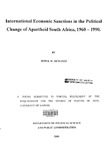| dc.description.abstract | This thesis investigates the role of international economic sanctions in influencing developments towards political change in apartheid South Africa between the years 1960 to 1990. The investigation is premised on the fact that despite an existing debate and controversy over the utility and role of international economic sanctions in coercing targeted states towards the demanded political changes by the sanctions-imposing states and other actors, a study of apartheid South Africa proves otherwise.
This thesis therefore seeks to discover the usefulness of international economic sanctions in influencing demanded political changes in apartheid South Africa from 1960 to 1990 vis-a-vis the existing general assumptions and experiences of this strategy in countries to which it has hitherto been applied. The study seeks to find out the effect of international economic sanctions on the apartheid economy and it's consequent effect in influencing developments towards political change. The study also intends to discover the effect of international economic sanctions on the political and non-political domestic forces seeking to apply pressure on the apartheid regime to change towards their desired political demands.
To achieve the above objectives the study covaried and compared apartheid's economy since 1960s with its performance after the 1980s when it was under increased international economic sanctions. The observation and comparison showed that the apartheid economy performed pooly when it came under economic sanctions directly and indirectly influencing the apartheid regime to take steps towards the demanded political changes in order to forestall its economy from eventual collapse. It was also established that as the economic sanctions were imposed, their negative effect on the apartheid economy consequently forced the political system into making concessions that catalysed political and non-political domestic forces into increased activity towards demanding for more political changes.
Three theoretical frameworks have been employed in this study. These are; the Power theory, the Marxist theory, and the International Moralist theory. The Power theory has been used to explain the decision by the international community to impose economic sanctions as an exercise of their power over apartheid South Africa. This has been explained by apartheid South Africa's dependence on the international community for trade through imports and exports of goods for the survival of her economy. This relationship made apartheid South Africa vulnerable to economic sanctions imposed by her trade partners. In order to stem the collapse of her economy, South Africa was compelled to modify her political behaviour to conform to the demanded political changes in order to continue enjoying the benefits of her trade with her partners.
The Marxist theory has been employed in the analysis of the role of political and non-political domestic forces pressurising for political changes in apartheid South Africa. The domestic forces mainly composed of the segregated black majority, who were the workers therefore forming the "proletariate" reacted to minimal reforms implemented by the apartheid regime in its system by uprising against apartheid as a whole hence quickening it's movement towards change or 'thesis'. we concluded that these forces complemented the international economic sanctions in coercing the apartheid regime towards the demaded political changes.
The International Moralist theory has been adopted to account for the international moral campaign of protest launched by the international community against apartheid under the auspices of the United Nations Charter and other governmental and Inter-Governmental Organisations. The basis of the imposition of sanctions arose from the need to contribute to the dismantling of the racist apartheid system which violated the faundmental principles of international law as enshrined in the United Nations Charter and other approved declarations and conventions against the denial of human rights and other universally recognised freedoms.
In terms of organization this thesis consists of five chapters. Chapter one consists of Introduction, Definition of concepts, Statement of research problem, Hypotheses, Methodology of research, chapters' layout and end notes. Chapter two consists of Introduction, General definition of international economic sanctions, historical evolution of internation economic sanctions, case studies of the performance of international economic sanctions, summary of the chapter, and end notes to chapter two. Chapter three is composed of introduction to the imposition of international economic sanctions to apartheid South Africa since 1960, the definition, characteristics and Historical Evolution of apartheid South Africa, reaction and response of the international community to apartheid, motivating factors leading to imposition of I E S against apartheid South Africa, the build - up towards the imposition of I E S against apartheid South Africa, summary and end notes to chapter three. Chapter four is composed of Introduction, Discussion on the effect of international economic sanctions on the performance of the apartheid economy and on the rate of the developments towards political changes in apartheid South Africa and on the effect of I E S on the rate of activities of domestic, political and non-political forces.Chapter five deals with findings conclusions and recommendations from this study. It also covers Endnotes and Bibliography to the study. | en_US |

